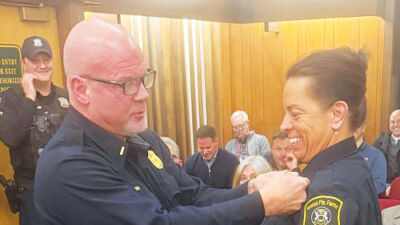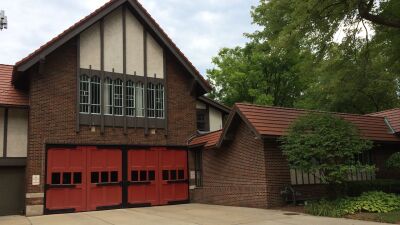GROSSE POINTE CITY — Grosse Pointe City has joined its neighbor, Grosse Pointe Park, in approving the purchase and installation of license plate readers in the municipality.
The project is being made possible by a gift from the nonprofit Grosse Pointe Public Safety Foundation, which has offered to purchase five cameras for each of the Grosse Pointes and Harper Woods from Motorola Solutions and pay for the first year of service for them.
At a Dec. 16 Grosse Pointe City Council meeting, City Public Safety Director John Alcorn was joined by a Motorola representative to discuss this equipment.
“We want to fight crime,” Alcorn said. “We want to catch the bad guys. But we (also) want to keep people safe, and it’s a good tool to do that.”
Law enforcement officials say the cameras deter crime, aid in investigations and help find people who are missing.
“All it’s doing is looking at plates as they go by and taking a picture,” said Jason Bernard, Michigan regional sales manager for Motorola Solutions. “It’s not looking at the driver. … It allows for future investigations.”
Alcorn said this is no different than an individual public safety officer running license plate numbers. He also said that, between other communities and the plethora of businesses and homes that have surveillance cameras, “the ship’s sailed. We’re (already) being recorded all the time.”
In addition, many neighboring jurisdictions have this technology in place. Alcorn said the Pointes and Harper Woods “are behind” by not having it.
“Thousands of agencies throughout the country are using it,” Bernard said of license plate readers.
With regard to the data, Bernard said it’s all “stored in a very safe place.”
“It’s very secure,” Bernard continued.
As to concerns about whether a law enforcement official could use license plate cameras to, for example, keep tabs on the comings and goings of an ex, Bernard said the system is set up to prevent activity like that.
“To search (the system), you have to have an incident number,” Bernard said.
Alcorn said the department wouldn’t retain the data indefinitely. Right now, he said officer body camera footage, for example, is typically saved for about 30 days after any contact with a person, while footage pertaining to an arrest is saved for 90 days. License plate reader data would most likely be save for roughly 90 days, he said.
Bernard said it’s the law enforcement agencies, not Motorola, that own this data.
More cameras could be added in the future, as long as the money is available for them.
“This is kind of the initial step,” Grosse Pointe City Manager Joseph Valentine said last month. “We recognize more cameras provide better service, but that increases the cost.”
Valentine said they’re hopeful additional fundraising will enable them to add cameras.
At a Jan. 13 council meeting, City Councilman Christopher Walsh asked what would happen if any of the Pointes or Harper Woods didn’t agree to have the license plate readers installed.
“Each member is separate,” Valentine responded. “The system is a nationwide system, and we’re buying into that.”
Mayor Sheila Tomkowiak said the city was entering into a one-year contract to have the system. She said the contract would renew annually unless the city acted to terminate it.
Valentine said the first year of the contract is covered by the Grosse Pointe Public Safety Foundation, while the second year would cost the city approximately $8,000.
The Grosse Pointe City Council voted unanimously Jan. 13 in favor of agreements with the Grosse Pointe Public Safety Foundation and Motorola to purchase and install the license plate readers and to authorize the city attorney to prepare a license agreement for equipment installation and authorize the city manager to execute agreements on behalf of the city.
“I think this is awesome,” Walsh said of the license plate readers.
At press time, Alcorn said they hadn’t determined precisely when the cameras would be installed. As to camera locations, law enforcement officials don’t want to share those because criminals would then avoid those spots.
 Publication select ▼
Publication select ▼

























